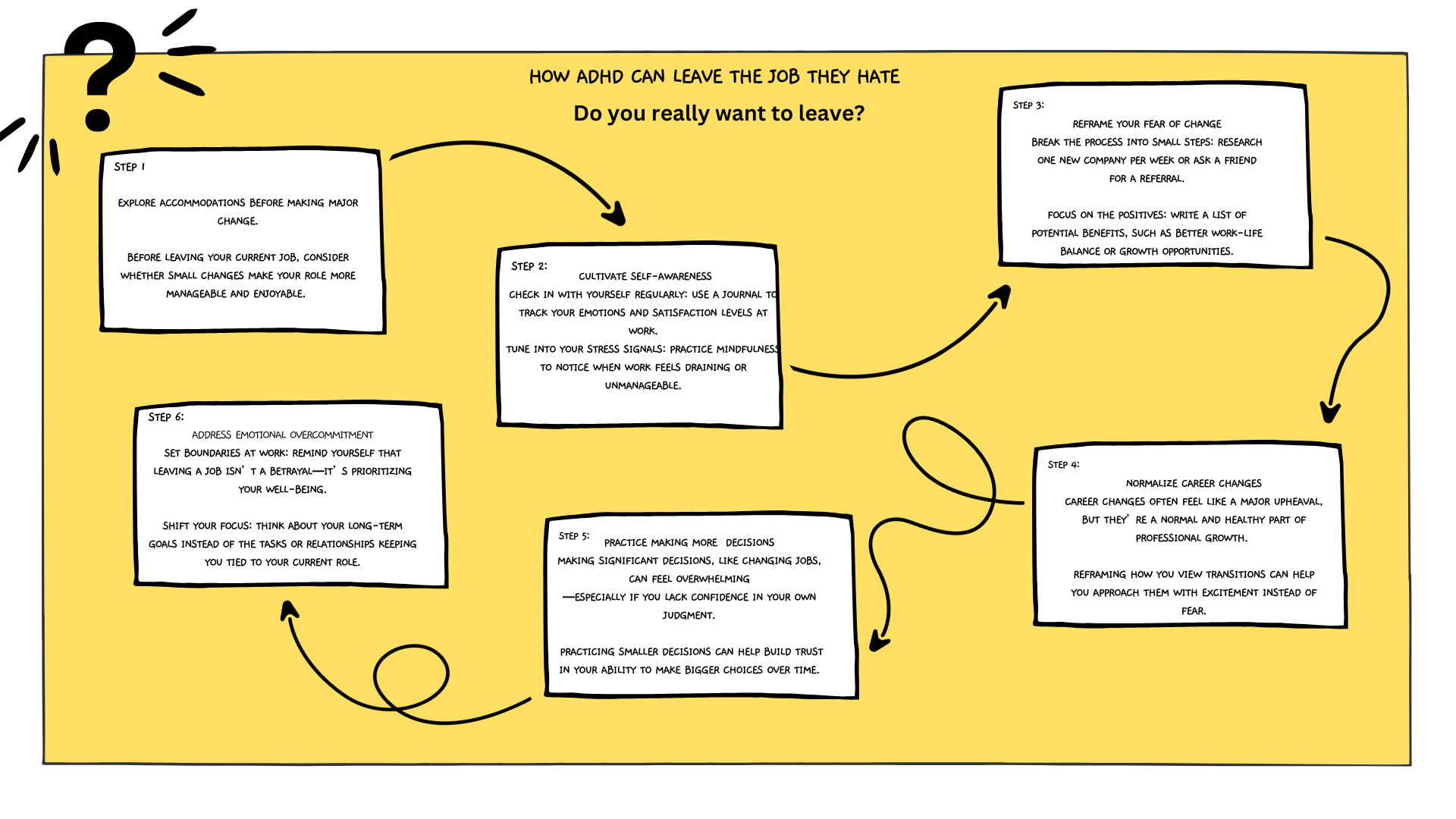Why ADHD Women Stay in Jobs They Hate—and How to Finally Leave
Why ADHD Women Stay in Jobs They Hate—and How to Finally Leave

Understanding the Challenge
For women with ADHD, leaving an unfulfilling job can feel daunting. Emotional attachment, fear of change, and practical barriers often keep them stuck. But addressing these obstacles with specific strategies can help pave the way toward a more fulfilling career.
Understanding why ADHD makes leaving jobs hard—and learning how to address these challenges—can help you break free from patterns that keep you stuck. With the right strategies, you can overcome these obstacles and make bold moves toward a more fulfilling career.
In this blog, we’ll explore some of the reasons you might feel stuck in your current role and share practical steps to help you move forward with confidence. Let’s dive in.
Taking Action: How to Move Forward in Your Career

Feeling Stuck? Steps to Build a Fulfilling Career with ADHD
Leaving a job that doesn’t match your strengths or needs can feel overwhelming, but you’re not alone. By breaking the process into manageable steps, you can reduce stress and create a more fulfilling career path.
1. Explore Accommodations Before Making Major Changes
Consider small adjustments to make your current role more manageable while you plan your next steps. Flexible hours, reduced meetings, or a quieter workspace can significantly improve your experience.
- Why it helps: Accommodations can ease stress and make your role more sustainable, giving you breathing room to evaluate your options.
- How to try it: Identify specific changes that could improve your workday, such as remote work or modified responsibilities. Have a conversation with your employer—they may be more supportive than you expect.
2. Cultivate Self-Awareness
If adjustments aren’t enough, understanding why your job feels unfulfilling is key. Self-awareness helps you identify the types of work that align with your strengths and values.
- Why it helps: Pinpointing what energizes and drains you enables you to make informed decisions about your career.
- How to try it: Keep a journal to track your emotions throughout the workday. Note moments of engagement versus frustration. Consider mindfulness practices or therapy to deepen your insights.
3. Reframe Your Fear of Change
Fear of change is natural, especially with ADHD, but it often stems from stepping into the unknown. Recognizing and addressing this fear can make it easier to move forward.
- Why it helps: Understanding that fear is part of growth helps you focus on potential benefits, such as better work-life balance or new opportunities.
- How to try it: Reflect on your fears and challenge them by visualizing positive outcomes. Remind yourself of past challenges you’ve successfully navigated.
4. Start with Small, Manageable Steps
Large transitions can feel paralyzing, but breaking them into smaller, actionable tasks makes them more achievable.
- Why it helps: Tackling one step at a time reduces overwhelm and builds momentum.
- How to try it: Begin with simple actions, like updating your resume, researching a company, or networking with a contact. Write down each task and check them off as you complete them.
5. Address Emotional Overcommitment
Strong emotional attachments to coworkers or a sense of loyalty can make leaving a job feel like a betrayal. Prioritizing your well-being is essential for growth.
- Why it helps: Shifting your focus from others’ expectations to your own needs empowers you to pursue happiness and success.
- How to try it: Set clear boundaries at work and remind yourself that self-care is not selfish. Visualize where you want to be in five years and evaluate whether your current role supports that vision.
6. Build Confidence in Your Decision-Making
Making big decisions can feel intimidating, especially if you struggle to trust your judgment. Practicing smaller choices can help strengthen your confidence.
- Why it helps: Decision-making gets easier with practice, reinforcing your ability to make sound, thoughtful choices.
- How to try it: Start with low-stakes decisions, like choosing a new hobby or trying a new recipe. For more significant decisions, seek guidance from trusted mentors, friends, or coaches.
7. Seek Support and Accountability
Building a support network is crucial for managing the challenges of career change. Surrounding yourself with allies can help you stay motivated and focused.
- Why it helps: Support from mentors, career coaches, or ADHD-focused groups offers fresh perspectives and emotional reassurance. Accountability partners help you stay on track.
- How to try it:
- Connect with a mentor or career coach to explore your doubts and plan your next steps.
- Join ADHD or career-focused groups to share experiences and gather advice.
- Lean on friends or family for encouragement and accountability.
- Highlight your strengths—such as creativity, adaptability, and problem-solving—when job searching.
8. Normalize Career Changes
Career changes can feel daunting, but they’re a normal part of professional growth. Reframing transitions as opportunities can reduce fear and help you approach them with confidence.
- Why it helps: Viewing changes as steps forward makes them feel intentional and empowering.
- How to try it: During interviews or networking, frame your career moves as deliberate choices to align your strengths with your goals. Remind yourself that growth is a process, and each step refines your path.
Why This Approach Works
Each step builds on the last, creating a sustainable path toward a fulfilling career. Start by improving your immediate work environment with accommodations, then use self-awareness and small steps to reduce overwhelm. Reframing fear, addressing emotional challenges, and leaning on support will empower you to make confident decisions and embrace new opportunities.
In Summary
ADHD traits—like rejection sensitivity, hyperfocus, and task paralysis—can make it difficult to leave an unfulfilling job. However, by breaking the process into smaller steps, reframing fears, and leaning on support, you can take control of your career and find work that aligns with your strengths and values.
You’re not stuck because you’re broken—you’re navigating a world that wasn’t designed for neurodivergent brains. With the right tools, support, and mindset, you can build a career that feels meaningful and empowering.
In Summary
ADHD traits—like rejection sensitivity, hyperfocus, and task paralysis—can make it tough to leave a job, even when it’s unfulfilling. But by breaking the process into smaller steps, reframing fears, and leaning on support, you can take charge of your career and find work that aligns with your values and strengths.
You’re not stuck because you’re broken—navigating a world that wasn’t designed for neurodivergent brains. With the right tools and support, you can create a career path that feels meaningful and empowering.


